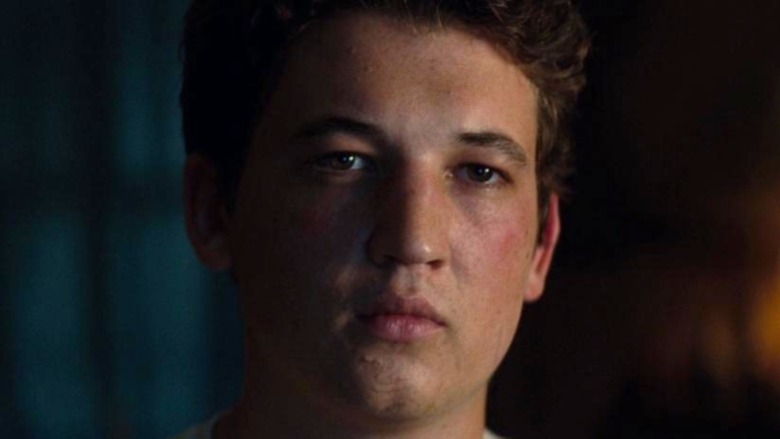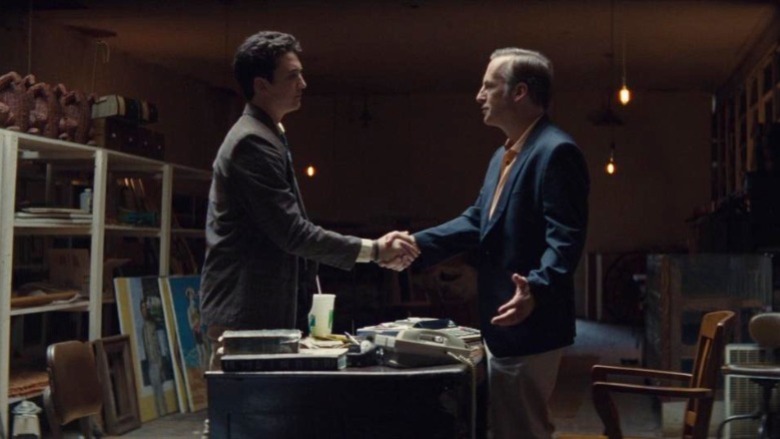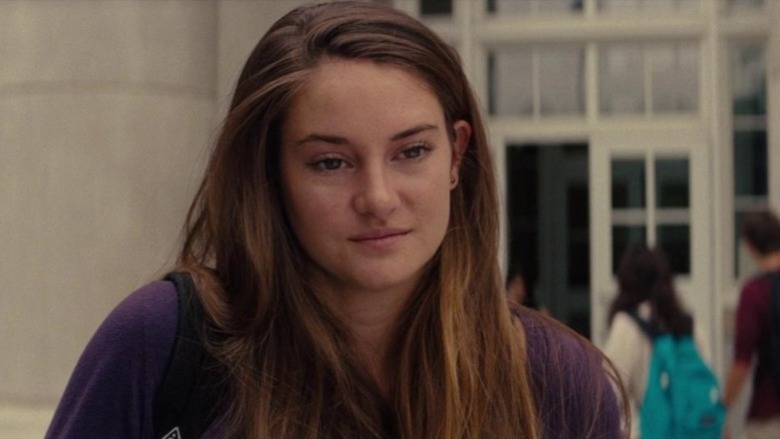The Ending Of The Spectacular Now Explained
Before A24 was a giant of indie cinema, with multiple Oscar wins and endless nominations under its belt, the studio started out as a small-scale, relatively little-known distributor. Its first big breakthrough came in 2013, with a triad of very different teen movies that took the arthouse world by storm: Harmony Korine's Spring Breakers, Sofia Coppola's The Bling Ring, and James Ponsoldt's The Spectacular Now. Of those movies, the former two drew controversy and became famous and infamous in equal measure. The latter, meanwhile, was universally acclaimed by critics.
And for good reason: The Spectacular Now, based on Tim Tharp's eponymous 2008 novel, is one of the last decade's most sensitive American movies about adolescence. Despite taking on the form of a cute, pleasant, unassuming teen romance of the sort you might find nowadays on Netflix's Original Movies section, the movie gradually shows its literary roots — as well as the work of screenwriters Scott Neustadter and Michael H. Weber, of (500) Days of Summer fame — and becomes complex, unconventionally heartbreaking, and hard to pin down. This might explain why it's so underappreciated.
The two protagonists, Sutter (Miles Teller) and Aimee (Shailene Woodley), are among the most three-dimensional characters you'll ever find in a teen movie. And part of what makes The Spectacular Now stand out is that it lets their story unfold organically, informed by all their flaws and complications, without forcing their lives into a neat narrative structure. So when the film's ending comes, it's perfectly ambivalent, wide open, and still full of deeper significance.
Sutter is in a dark place at the end of The Spectacular Now
Where many movies of its ilk would angle on a well-defined plot, with the character arcs serving as "subtext," The Spectacular Now is entirely the story of Sutter Keely and his stunted, fits-and-starts emotional development. He introduces himself to us as an air-headed, hard-partying, hard-drinking popular kid, forced into introspection for the first time after getting dumped by his girlfriend Cassidy (Brie Larson).
His friendship and eventual relationship with shy geek Aimee Finecky encourages him to take himself more seriously, but he has trouble figuring out what he wants from life in the long term, his drinking problem becomes more apparent, and the responsibility of being Aimee's first boyfriend overwhelms him. The last third of the movie becomes almost punishing to watch, as Sutter realizes how similar he is to his estranged deadbeat father, gets cast aside by him during a reconciliation attempt, alienates Aimee, and misses the deadline for college applications.
Near the end of the movie, Sutter makes two major choices. First, he admits to his boss at the clothing store (Bob Odenkirk) that he can't be trusted to work sober, and quits his job. Then, he ghosts Aimee as she's expecting him to tag along with her on her move to Philadelphia, effectively ending their relationship by inaction. These two decisions point to Sutter's standing at the end of the movie. He's never been more conscious of his problems, but, instead of working through them, he has retreated into stewing in despair. He is still unable to see things with perspective. When he's in pain, he still believes the pain will last forever. It's hard for him to imagine any future at all, let alone one in which he has somehow fixed all the things he's screwed up.
Sutter is finally able to see beyond the now
It would be dishonest if The Spectacular Now ended with Sutter having a major emotional breakthrough and managing to turn his life around easily; for the Sutter we've come to know at that point, change is near-unthinkable. So instead, Neustadter and Weber do just the right thing — they end Sutter's story on a leap of faith. The intense argument with his mother Sara (Jennifer Jason Leigh) serves to drive into his head, if only momentarily, that he is loved, valid, and different from his father. That nugget of encouragement might not be all it would take for Sutter to operate a whole self-reinvention, but it's enough for him to finish writing his application letter, in which he finally reasons with himself that, despite all he's lost, it's not too late for him.
To the very end, The Spectacular Now is concerned with emotional authenticity. Sutter's letter is not very articulate, and he jumps from shame to hope in it rather abruptly, without a rhetorical throughline. There's no telling if the circumstances will permit him to improve. And yet, he decides to give it a shot — which, for a boy who previously had no concept of the word "future," counts as a big breakthrough.
So the movie ends with the montage of him going to Philadelphia to find Aimee, without telling us just what he intends to do there, what his new plans are, or even what he's going to tell her. It's seemingly an impulsive decision, like all the others he's made up to this point. But it's the first impulsive decision he's made that's predicated on hope for the future. That modest development is enough for The Spectacular Now, a movie about real people going through life as best they can. And it's certainly enough for us, the viewers, as Aimee's uneasy half-smile upon seeing Sutter again reminds us of the beauty of their story — that they're young, their lives are just starting out, and there's plenty of time for them to work things out.


